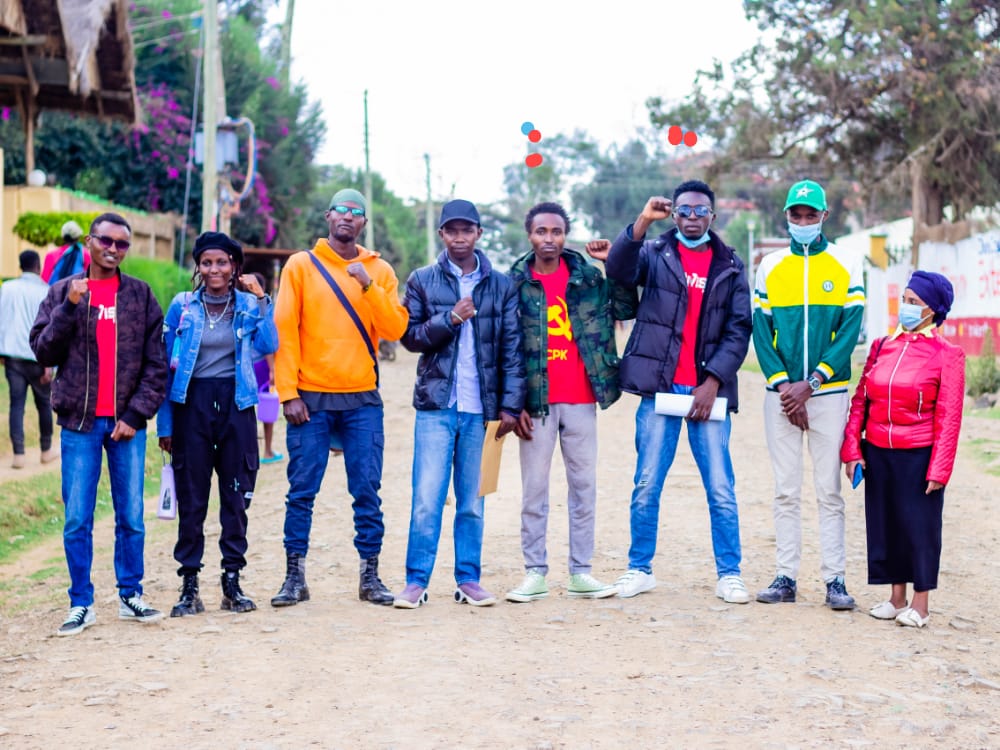
CALL FOR APPLICATIONS
HUMAN RIGHTS DEFENDERS’ ANNUAL ACADEMY 2022
DEADLINE: 10 October 2022
A. BACKGROUND
The National Coalition for Human Rights Defenders in Kenya is now accepting applications for the Annual Human Rights Defenders’ Academy. Deadline: 10 October2022.
Defenders Coalition which is the National Coalition of Human Rights Defenders works primarily for the protection of Human Rights Defenders (HRDs) in Kenya and was formed in 2007 to enhance the safety and security of HRDs’ and their operating environment. Defenders Coalition plays a critical role of watching over HRDs who are at risk because of their human rights work.
The organization shields the HRDs from risks in the following ways:
1) Supportive Policy, Legal and Institutional Frameworks: Defenders Coalition has positioned itself as a collaborative leader towards (re)formulation and enforcement of appropriate policies, laws, institutions, and cultural norms that touch on the safety, security and wellbeing of HRDs. Defenders Coalition seeks to contribute to securing a conducive operating environment for HRDs, and in which respect for human rights is accorded to all.
2) HRD Protection and Safety: Facilitating timely and appropriate responses to all forms of threats or insecurities to HRDs through strengthening the capacities of HRDs and other service providers, more so, duty bearers, lawyers, medical personnel, and counsellors among others. Defenders Coalition intervenes in a timely way whenever HRDs are at risk and deliberately establishes strategic partnerships with complementary referral systems to ensure a systems approach to HRD support.
3) Socio-Economic Wellbeing of HRDs: Defenders Coalition aims to facilitate HRDs to build their socio-economic resilience and attain improved quality of life. Such support seeks to ensure that HRDs are self-sufficient, easily access the necessities of life and live in dignity. Defenders Coalition strengthens the capacities of HRDs to engage in productive activities to increase their self-reliance and income security.
4) Institutional Excellence: Internally, Defenders Coalition seeks to consolidate its position as a dynamic, effective, and sustainable organization. The focus is to further strengthen/ diversify our resource base, human resource, and leadership capabilities, as well as our internal systems, policies, and structures.
For seven years, the Defenders Coalition has organized the convening for human rights defenders, journalists and activists to reflect on the environment and concerns that have been there through the year as well plan for the coming year. Participants are also exposed to skills enhancement, networking and public awareness sessions. The HRD Annual Academy runs for five (5) days with participants being trained on:
1. Physical and Digital security management.
2. Safe and effective monitoring, documentation, and reporting of human rights violations.
3. Psychosocial debriefing.
Participants must be willing to learn in a fast-paced programme and should have the capacity and commitment to maximize their benefit from the programme.
B. DATE
The Academy will be held between 28th November 2022 – 2nd December 2022 in Nairobi, Kenya. The Call for application is open to HRDs from all the 47 counties of Kenya working on all thematic human rights themes including:
a) Women and girls’ rights
b) Democracy and governance
c) Pease and Security
d) Civil and political rights
e) Social and economic justice
f) Environmental and natural resource management justice
g) Rights of minority groups
h) Any other human rights issues
C. SELECTION CRITERIA
Relevance: The course is primarily targeting human rights defenders who are actively involved in the work of promoting human rights and can apply the knowledge gained from the course in their daily community organizing.
Added value: Defenders Coalition will prioritize applicants who have not undergone similar extensive training before Geographical location: Our aim is to select a diverse group who can provide an array of perspectives and share experiences. Applying individuals must be based in Kenya from the 47 counties and should mainly be carrying out human rights work.
Gender balance: It is important for us to strike a fair gender balance.
Language: A good level of English and Kiswahili is required to follow the training.
D. BENEFITS
1. Participants will be able to take part in the workshop over a period of five days, with Defenders Coalition, to ensure that learning is tailored to the needs of the group.
2. The participants will define and work on their own project throughout the course of participating in the workshop and receive support and mentorship in realizing their project vision.
3. Participants will also become a member of our alumni network after they have gone through the whole cycle, including access to mentors, creatives, safe sister signal group, a mailing list, e-learning opportunities, and priority in subsequent events.
4. Daily Accommodation for the entire period
5. Access to full day conference facilities for the training period
6. A transport reimbursement at the Defenders’ Coalition rates.
7. A certificate of participation.
8. Will get the opportunity to attend the Annual Human Rights Defenders Awards feting Ceremony on 2 December 2022.
E. APPLICATION
Selection into the Workshops is highly competitive. We encourage you to apply early and put your best foot forward.
Phase 1: Fill out this application form by 10th October 2022.
Phase 2: Selection
Shortlisted applicants will be contacted.
Phase 3: Preparation for the Workshop.
If you are selected to attend the academy, you must demonstrate availability for the period as well as ability to learn.
Phase 4: Academy Convening
The workshop will take place from the 28th November – 2nd December 2022 unless otherwise communicated.
For any inquiries, please contact academy2022@defenderscoalition.org
Applicants should fill in this application form
Download the Newsletter here
The excitement in the mouths and eyes of every Kenyan is enough indication that Kenya are looking forward to the establishment of a new government -of hope, inclusion, protects and promotes human rights and rule of law. Despite the tribulations facing Kenyans ranging from the high cost of living, reduced quality of life, unemployment, stinking corruption levels, insecurity, attacks on the civic space and unwillingness of the state to adopt and implement progressive constitutional provisions and legislations such as the two third gender rule and the human rights defenders’ policy, there is a glimmersof hope in the faces of many: that after taking part in choosing their next government on August 9 and they eventual outcome of the ongoing petitions at the Supreme Court of Kenya, they have an opportunity to actively hold the incoming government accountable.
We are optimistic that the general elections will be conducted in a transparent manner, will be free, fair and verifiable to inspire our future generations on the fidelity of the current generations to our commitments to promoting the enjoyment of democratic rights and the rule of law.
Defenders Coalition welcomes the High Court judgment by Lady Justice Jessie Lessit on Mavoko 3, where human rights defender Willie Kimani was brutally murdered by police officers. The conviction of the three police officers and one informer as the murderers of the #Mavoko3 is the slightest success in the corridors of justice regarding human rights defenders in the justice system in Kenya. We hope that the same wheels of justice will turn for the other victims of police brutality including the#Kianjokoma Brothers, Baby Pendo, Vaite, Yassin Moyo and many more.
I welcome you to enjoy this read, where we tell the steps made in securing the safety and security of all cadres of Human Rights Defenders, Election monitor and observers, civil society organizations and grassroot organizations. You will have a feel of the skills impacted on HRDs, the advocacy work conducted and how the Defenders Coalition aspires to widen the network of champions of human rights and social justice in Kenya.
I urge you to continue supporting our work by sharing our work, partner with us or donate directly. More details on how to partner can be found on our website at www.defenderscoalition.org or talk to me on email: dk@defenderscoalition.org.
Kamau Ngugi
Executive Director – Defenders Coalition
Download the Newsletter here
Defenders Coalition 2022 Election Report
Kenya is slated to hold its General Elections on Tuesday the 9th day of August 2022 for the 3rd time under the constitution of Kenya 2010. It’s important that the lessons learnt in previous general elections as documented in the Defenders Coalitions monitoring reports and other related reports by election stakeholders are fully incorporated in furtherance of a democracy in Kenya.
The legal framework on the Bill of Rights and specifically political rights as provided for under Article 38 our constitution and key legislation that govern election processes all enacted in a quest to attain electoral reforms that ensure a free, fair and credible election that reflects the highest aspirations of the Kenyan people.
It’s against this backdrop that Defenders Coalition, a key stakeholder in elections has capacity built and strengthened grassroot HRDs with advanced skills on Election Monitoring, Documentation and Reporting on human rights violations pre, during and post election period.
In order to ensure that the election process reflects the true wishes of Kenyans in the upcoming 2022 general election, Defenders Coalition deployed HRD monitors to monitor and document the electoral process and working environment of the HRDs.
We can proudly highlight the following key milestones made during the last one year of monitoring:
1. Revamped a phone based application monitoring tool (Mtetezi) used by monitors to document human rights violations that enhanced quick, timely rapid response to any such violations.
2. Defenders Coalition has trained over 300 HRDs and over 20 Organizations on Digital Security and Physical Security, and monitoring, documentation and reporting.
3. Defenders Coalition successfully mobilized critical partners to jointly engage in advocacy over pressing human rights issues in Kenya.
4. The presence of Defenders Coalition as the spokesperson for HRDs served to denounce and resist harmful actions on the environment of HRDs, and uses advocacy as a key tool for enhancing accountability for electoral related human rights violations.
5. Defenders Coalition innovatively responded to humanitarian and resilience needs of HRDs and CSO organizations.
6. Defenders Coalition through collaboration pathways with partner organizations have ramped up multiple coordinated interventions and strategies to expand freedom of information and transparency. The information is designed to identify malpractices and raise the quality of political contests so that they meet human right standards and principles.
FOR IMMEDIATE PRESS RELEASE
CIVIL SOCIETY STATEMENT ON THE STATE OF CIVIC AND DEMOCRATIC SPACE IN KENYA AHEAD OF THE GENERAL ELECTIONS
Civic Freedoms Forum is a national platform composed of civil society organizations (CSOs) operating at national level with a track record and commitment to the protection of human rights, civil liberties, and democracy. CFF aims at consolidating civic actions for the advancement and protection of human rights, civil liberties, and democracy.
NAIROBI, 14 JULY, 2022 –
As the Country approaches the August 2022 General Elections, the civil society members, convening at the All Africa Conference of Churches during the Civic Space Protection Summit, note with concern the sad state of the civic and democratic space in Kenya. Civic space in Kenya is currently ranked as obstructed by the Civicus Monitor. The civil society members would therefore like to address the following concerns:
Public Order Management
Despite the ratification of international and regional treaties meant to safeguard protest, the Kenyan state and the police continue to use unnecessary or disproportionate force as well as harassment to discourage, prevent or disperse protest. Poor, marginalised groups and women often experience particularly negative treatment at the hands of the authorities.
A recent study report by Article 19 titled The Kenya: Restricting the Right to be Heard found that, instead of protecting protest, Kenya’s police are frequently responsible for unlawful conduct, including brutal use of force, violent repression and unlawful arrests of protesters. Police are meant to exercise restraint and actively help facilitate the right to protest. Instead, police brutality often leads to tragic consequences and those responsible face little accountability. For instance, in June 2022, four people were killed after police fired shots at protestors in the Masimba area of Kajiado County, when people took to the streets to protest the authorities’ inaction over the rising number of wild animals’ attacks. The investigation by the Independent Policing and Oversight Authority is ongoing, but campaigners feel that it might face obstructions and delays.
The study also found that the Kenyan authorities act especially swiftly against protests likely to embarrass the State or mobilise external pressure. In April 2022, Kenyan activist Julius Kamau was violently assaulted by three plain-clothed police officers, while protesting alone as part of the #NjaaRevolution movement which saw people protesting the rising cost of living. Four other protesters were subsequently arrested and held for simply exercising their rights. The right to peaceful assembly is thus often criminalised and not facilitated as the case should be.
Digital Space Protection
In Kenya, the freedoms of expression, access to information, the right to privacy and other fundamental freedoms are well entrenched in the Constitution. Despite this, Kenya still staggers towards limitation of digital rights in certain aspects. A raft of legislations, executive orders and actions in the digital space have been witnessed since 2010 thus limiting the civic space in Kenya.
In March 2017, a report by Privacy International documented how the information acquired from unlawful communications surveillance is justified by the state as a response to counterterrorism – from surveilling, profiling, locating, tracking, and arresting targets to abuse, torture, abduction and extrajudicial killing.
During this electoral period, there have also been concerns that human rights defenders (HRDs) and journalists are continuing to be surveilled by the government because of the nature of the work they do, including because such work can be critical of the government, rather than for a valid law enforcement purpose. For instance, on 27 May 2022, twitter accounts linked to the Social Justice Centers and the #NjaaRevolution Campaign leaders, for allegedly exhibiting ‘suspicious behavior.’
The government “periodically polices the internet for content that is perceived to be morally objectionable,” and “has increasingly sought to have content removed online” and from social media profiles. The use of social media monitoring, the techniques and technologies that allow companies or governments to monitor social media networking sites creates potential for misuse by the government in identifying and targeting certain people and groups in society including HRDs and journalists.
Media and Access to Information
Although Kenya has an elaborate legislative and institutional framework on Access to Information, Kenyans still face challenges in accessing information due to a culture of secrecy in public and private bodies performing public functions. Despite initiatives to enhance transparency and fulfill the right to information, execution has been slow and allegations of opaqueness stemming from a culture of secrecy remain widespread.
Access to information at the county level has been a work in progress with counties like Elgeyo Marakwet, Makueni, Nandi and Isiolo being exemplary. For instance, in 2020 Elgeyo Marakwet was the only county to publish all seven of its budget documents as required by Kenya’s Public Finance Management Act of 2012. Additionally, the CAJ developed a model law on Access to Information for county governments and so far five counties – Embu, Kisumu, Bomet, Kwale and Kiambu – have passed the County ATI Law.
Disinformation and misinformation practices, especially at election time in Kenya, aren’t new. But platform media provide easier and faster ways of fabricating information and distributing it at scale. Those involved are doing so with little fear due to the platforms’ ability to enable anonymity and pseudonymity. This involved massive data manipulation done through the deliberate posting of fake news. There is evidence that these practices are on the rise for the upcoming polls scheduled for August 2022. Many governments are failing to act because of conflicting demands. On the one hand, they need to protect the public from perceived harmful information. On the other hand, they need to protect citizens’ rights to information and freedom of expression. It gets even more complicated in countries such as Kenya where the state, as well as extensions of the state, are actively involved in misinformation and disinformation campaigns.
A survey by the International Budget Partnership Kenya (IBP-Kenya) shows Kenyans still have limited participation and information on county budgets. West Pokot, Laikipia, Nyeri, Makueni and Samburu were the top five, most transparent in the budget-making process for the current financial year ending June 30 while Kirinyaga, Narok, Taita Taveta and Wajir each scored zero as they provided no information at all.
Finally, protection for whistleblowers is also a fundamental principle of Access to Information. Individuals who release information on wrongdoing – whistleblowers – must be protected from any legal, administrative, employment-related sanctions, reputational and physical harm. Unfortunately, Kenya has a history of failing to protect whistleblowers.
Safety and Protection of Human Rights Actors
Kenya has no clear policy or legislation to protect human rights defenders (HRDs). Despite many actors advocating for stronger protection of HRDs and hopeful promises made by the government, no concrete steps have been taken to implement new policies. The African Commission offers a monitoring mechanism for the situation and safety of Human Rights Defenders through a Special Rapporteur on Human Rights Defenders for Africa. In Kenya, however, no concrete policy proposals have followed from this mechanism, nor has any report on the situation of HRDs in Kenya been issued.
Important progress has been made by the Kenya National Commission on Human Rights (KNCHR), the National Coalition of Human Rights Defenders- Kenya (Defenders Coalition) and other Civil Society Organisations. This includes the KNCHR Model HRD Policy and Action Plan in May of 2017. This policy provides a framework for the protection of HRDs, accompanied by an action plan that identifies the priority areas on safeguarding the rights of HRDs. KNCHR has continued to advocate for adoption of this policy, but no steps have yet been taken towards its implementation.
The last twenty-seven months have witnessed increased cases of attacks, killings, and intimidation of HRDs, allegedly committed by state and non-state agencies. They have been harassed by local administrators and other private actors and in some cases they have faced trumped up charges aimed at intimidating them into silence. Unfortunately, many of these cases are not prioritized and receive little national media attention.
While acknowledging increasing efforts in many countries to protect the rights of members of Sexual, Orientation, Gender, Identity and Expression (SOGIE), we remain seriously concerned with the widespread violation of these communities in Kenya in recent years. We are concerned that within the past one year, Defenders Coalition has documented 23 cases of violations including but not limited to violent murder, assault, and forceful eviction of LGBTQ+ individuals across Kenya with little to no action by the relevant duty bearers in promoting the safety and security of sexual minority individuals as well as seeking justice for the victims.
In order to secure civic and democratic space during elections and beyond, the civil society members demand the following:
Signed by the following
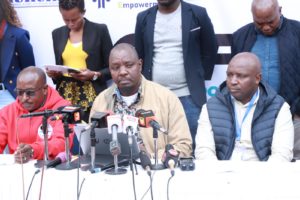
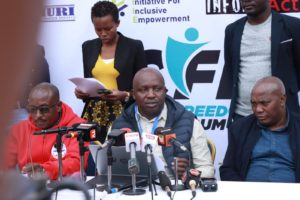
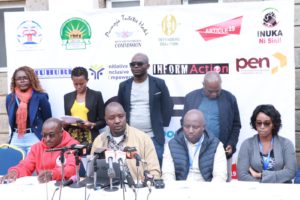
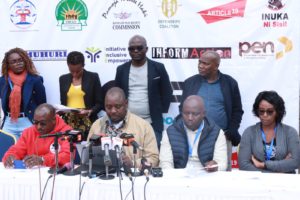
It is injury time for Kenya as the August 9 general elections approaches. Its that time when like others who believe in democracy the citizen have the opportunity to renew mandates of their leaders to govern the state in their behalf, or replace them with those that they believe provide alternative solutions to their problems or meet their aspirations. To make informed choices, political parties and individuals develop and market their manifestos.
Various government agencies are tasked with putting their houses in order for the peaceful conduct of the election and to ensure the process lead to free, fair and credible. The Independent Electoral and Boundaries Commission (IEBC) for example must act as a fair umpire and ensure the field is fair for all players by ensuring that enabling laws are in place and followed to the letter, and the electoral infrastructure is beyond reproach. The security agencies ensure the leaders freely and safely market their candidature and the citizens make choices out of free will and not through coercion, intimidation, violence, threats or insults. On the other hand, advocates of human rights including civil society organizations (CSOs), Community Based Organisations (CBOs), HRD Networks, Human Rights Movements and human rights defenders (HRDs) are keen to promote electoral integrity, respect for human rights and accountable leadership prior to, during and post election 2022.
Defenders Coalition which is concerned with good governance, rule of law and the respect of human rights for all by working with human rights defenders at the frontline to ensure that they are safe when conducting their frontline role of promoting peace, harmony, justice and the respect for human rights. We have made deliberate efforts to strengthen the capacities of Civil Society Groups and individuals to effectively play their critical role of monitoring, documenting and reporting human rights violations during the election period for timely remedies and justice for the victims. Defenders Coalition has trained and deployed 105 monitors to conduct this work across 29 counties in Kenya. We are also collaborating with our partners that have monitors in the other counties to share critical information that is helpful in advancing the safety of HRDs and election monitors from all the 47 counties in Kenya.
Among the benefits that HRDs have gained from the Coalition is skills to confront and manage risks during the 2022 elections period. Over One hundred and Fifty HRDs (155) undergone training in digital security management following documentation of risks encountered when HRDs conducted advocacy at digital platforms. Out of 155, trained, 60% are Women Human Rights Defenders (WHRDs) and sexual minority rights advocates.
In addition to leadership in enhancing HRDs safety, Defenders Coalition has been encouraging the HRDs family to prioritize the physical and mental wellbeing. As a demonstration, we launched and continue to rally HRDs to participate in outdoor excursions. The most successful in 2022 being able to successfully conquered Mt. Kenya in March. During this physically challenging but rewarding endeavour 17 out of 17 climbers made it to Point Lenana demonstrating resilience and commitment to a good cause of raising awareness on human rights violations and to funds for the establishment of the Haki Village; a resource hub for HRDs and the larger human rights community.
It is unfortunate that we such positive human rights strides we also encountered huge setbacks. Human rights defenders Elizabeth Ekaru and Sheila Lumumba were brutally murdered in 2022 with little progress in holding those responsible to account. In the case of Elizabeth, an arrest was made and the matter is in court. However no arrest were made for the killers of Sheila despite massive public outrage. Other Cases of HRDs killed in previous years remained unresolved including Paul Ndirangu Kioi killed in 2020, environmentalist Joanna Stutchbury, in 2021, Journalist Betty Barasa in 2021, and Joash Mosoti in 2021. There has also been worrying escalation of attacks of the rights of sexual minority individuals and groups with impunity including routine harassment by law enforcement agents, arbitrary arrests and detention, extortion, sexual violence, physical assault, and evictions.
The state also intensified tactics violating or limiting civic action by regularly arresting HRDs who dared to assemble peacefully and petition various duty bearers over a range of issues. Because of these harassment Defenders Coalition support to the criminalization through bail, bond and legal representation increased. It’s unfortunate that judicial harassment remained the leading tactic of limiting HRDs agency.
Despite all these, we recognize the fact that the level of awareness on the need to promote and protect human rights in our communities has increased. This means that silence is not an option when violations occur. Defenders Coalition, therefore, affirms its fiery commitment to collaboratively act, with quality and in a timely manner, at the preventive and responsive levels to ensure safety, security and wellbeing of those involved in the work of speaking truth to power in all the 47 Counties in Kenya.
August 9, 2017 remains etched in Benna Buluma’s mind. Something tragic happened in the life of the resident of Mathare slum in Nairobi County.
In a flick of a moment, she lost her two sons whom she says were caught in the fire during protests that followed claims of election fraud by Orange Democratic Movement leader Raila Odinga.
Bernard Okoth, 25 and Victor Okoth, 22 were killed by the police who used live bullets to disperse the protesters at Mathare Number 10, she says.
“They had alighted at Huruma (an estate near Mathare) from town (Nairobi city centre) at around 2pm.They had gone to look for money,” she explains.
Bernard was a tailor at Gikomba market, while Victor was a casual construction worker. On this day, she was expecting them back by 3pm as they had left their children with her. Unfortunately, they were caught up in the chaos as they walked down to their mother’s house. To their children.
Bernard had a three-year-old son waiting for him. While a one-year-old girl was counting seconds to be in her father’s arms again; dad Victor.
But then, at 3pm, Ms Buluma heard loud thunderous gunshots from the side of Mathare Number 10. She knew things were bad. But for her, things would soon turn out worse.
By 3.30pm she was unsettled. “Where are my sons?” she wondered.
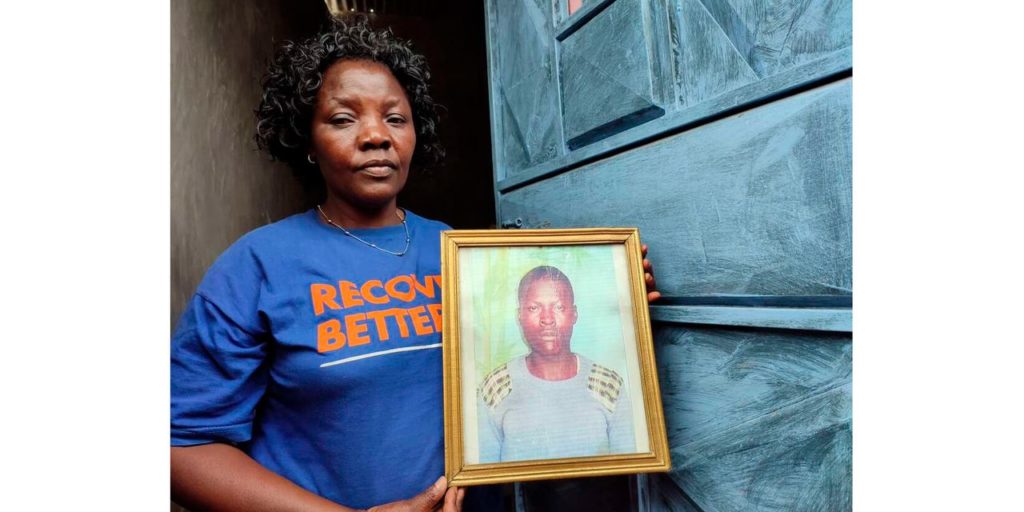
Benna Buluma holds a portrait of her son,Victor Okoth,whom she says the police shot dead during a poll protest in Mathare slums, Nairobi county on August 9, 2017.Photo taken on April 11,2022 at her house in Mathare.Moraa Obiria/Nation Media Group.
She opted to make her way near where she had heard the gunshots to have a clear picture of the events.
Even before she would ask anyone what was happening, she heard a man say some young men “wameangushwa”, which would literally mean, “they have been fallen.”
Moments later, Victor’s wife, came running to her saying the same. At this point, she was confused. Another woman told her to go see for herself the crime scene. Together with her daughter-in-law, they went, only to be met by a life-changing moment that made her freeze in devastating shock. Her sons had been shot dead.
It was indeed a painful turning point in her life.
She buried her sons in Kisumu County in November, of the same year and returned to Nairobi to find more than 21 women crying for justice.
In her quest for justice, she joined Mathare Social Justice Centre, a community-based organisation that advocates for social justice and documents human rights violations.
It is here that she met the women, some whose sons had been killed by the police. Others tortured or raped by the officers.
These women had their cases followed up by a social justice organisation but they were too afraid to publicly speak against the violations for fear of reprisal. All their cases involve the police as the perpetrators.
But even in the depths of her pain, Ms Buluma offered to give them a voice.
In December 2017, they decided to form Mothers of Victims and Survivors Network, expanding the scope to Kayole, Mukuru, Kasarani, Kibera, Kariobangi and Dandora. She is the network’s convenor.
Now with more than 60 women under the umbrella body, Ms Buluma has since 2017, documented more than 30 new incidents of abuse of the rights of both gender in the slums.
Her case being among them and she has forwarded all of them to the Independent Policing Oversight Authority (IPOA). But none of them has since been prosecuted, she says.
“Sometimes it feels like there is no need of monitoring and documentation these human rights violations. But when you remember what you have gone through, you tell yourself, ‘I’ll not stop until justice is delivered,’” she says.
Various organisations including Defenders Coalition have trained the women in the network on monitoring and documenting abuse of human rights violations, she says.
On many occasions, she has been intimidated especially when she visits the victims in their homes.
“You will see someone following you but that does not bother me. I am not afraid of death. They already killed my sons,” she says.
She asserts that: “If you remain silent you will never get help. Even if you say you won’t speak because you will be killed, if he wants to kill you, he will still kill you.”
She says the women are in “so much pain” because their cases have dragged on for too long yet the country is nearing another election.Yet to be concluded at the Milimani law courts are 21 cases of extrajudicial killings by the police, lodged by a social justice organisation on behalf of the women in the network. But hers is still at the hands of IPOA.
She says for her and her fellow women in the network, the mention of holding General Election on August 9, throws them into indescribable illness.
“Our bodies become weak. You walk around filled with anger. I walk around absent-minded,” she says.
“I feel totally abnormal but since I am a leader I’m forced to sober up and be strong for other women,” she explains.
For now, they are trying to find peace and solace in their network.
In June last year, they were lucky to find a sponsor who has rented a room for them in Mathare. The room has become a safe space for them to relieve each other’s pain.
The sponsor also provides a stipend that she spends to visit the victims who are in urgent need of consolation.
Her worry is if the donor withdraws support before they find a sustainable footing to continue doing the human rights work. Before 2017, she was a casual domestic worker in Eastleigh earning a monthly wage of Sh5,000.
She says, they want to start a peanut business but they are stuck at the point of taking off.
“We want to buy a peanut butter machine. But we have not found a place to install the machine because we don’t have money to rent a place,” she says.
This story was first published by Nation Media Group. This is not a reproduction but an amplification of the message.
Read the article of Nation Media Group page here https://nation.africa/kenya/news/gender/benna-buluma-lost-two-sons-in-2017-poll-chaos-she-now-dreads-august-9-3790652
For Florence Achuya, her day is incomplete if she fails to defend the vulnerable in society and ensure justice is served for them.
She has been doing this for the past 11 years despite her daily family activities. She is financially constrained but says she is ready to soldier on.
“I like being a fighter. I represent Women Justice Centre in Vihiga County. I am a defender by nature.”
In her, she says, there exists a spirit of changing lives in any challenging situation that comes her way. This being an election year, she says she is upscaling her resolve to penetrate the political terrain in protecting the rights of women and the vulnerable ahead of the August 9 polls.
As a result, she has been picked as an election monitor and has her job cut out. She began by monitoring the registration of aspirants by the Intendent Electoral and Boundaries Commission, an exercise that saw her move from one office to another assessing the clearance process.
“I fight for women, girls and even boys. I feel that the boy child has been neglected. I am happy being a defender. I feel happy when I succeed in defending people because it leaves me with fulfilment and satisfaction that someone has received justice as a result of my effort.”
But the challenges she faces could be heavier. She, for instance, cites difficulties in reaching survivors and victims, amid financial constraints. She says is if she would be financially empowered, her reach and scope of duty would be widened and she would make more positive impacts on lives.

She got her training in human rights from the National Coalition of Human Rights Defenders, Kenya, and notes that this has equipped her with more information and technical know-how in handling her resolve professionally.
The objective of the National Coalition for Human Rights Defenders, Kenya, is to champion the safety, security and well-being of human rights defenders.
The body is a national organisation that is incorporated in Kenya as a trust. Its mission is to strengthen the capacity of human rights defenders to work effectively and to reduce their venerability to the risk persecution.
t currently has 3,456 members and has trained 2,504 human rights defenders from 14 networks, according to the information on its website. Ms Achuya says the training she got from the coalition is the reason she has been approved as an election monitor by the IEBC.
She says she feels monitoring the election process will place her right at the centre of getting access to first-hand information on the planning of the forthcoming general election. She believes this will also sharpen her skills in championing the rights of women before, during and after the election.
“In the process, we are able to campaign for peace and peaceful coexistence.”
To beat the financial constraints, Ms Achuya says she and a group of other defenders are involved in soap making, handcrafts and farming to boost their earnings and fund their daily activities.
But this is not enough. She appeals to well-wishers to support their activities to ease their movement and communication.
“Despite the constraints, I keep going because I feel I must do something to its logical conclusion,” she concludes.
This story was first published by Nation Media Group. This is not a reproduction but an amplification of the message.
Read the article of Nation Media Group page here https://nation.africa/kenya/news/gender/vihiga-woman-relishes-rights-advocacy-despite-hurdles-3848958
Her facial expression clearly tells how determined she is in the world of activism. Meet Rukia Rashid Ibrahim, the youngest female human rights defender in Lamu County.
Aged just 24, Rukia spends most of her time defending the rights of men and boys, whom she says are forgotten. As a female activist, she boasts of having stood out for being a rare voice for abused men.
Her passion for activism drove her to postpone her teaching course four years ago, just to enable her to engage fully in defending human rights. Rukia believes she was born a human rights activist, nothing else.
Defending her move to fight for the male gender, she notes that in recent years, many campaigns have been concentrated only on women and girls. Men and boys are forgotten, yet many of them lead tough lives, with some stuck in drug abuse due to the stress that comes along with the overwhelming duties that they are expected to carry, she says.
Rukia says that even if women have better jobs than their husbands, the community still expects the men to be the ones taking all the family roles—providing food and school fees, catering for health expenses, and paying rent.
She is concerned about how society, particularly the Muslims population, has been unfair on matters of dowry payment. She says many parents and brides have a tendency of demanding hefty bride prices, a situation forcing some men to remain single.
Others have to do awkward jobs for years, just to get money for a wife. But she is determined to have the community change.“You can’t demand Sh300,000 and above as dowry and you expect a man without a job or one who just does menial jobs to pay such a hefty amount. I feel that’s unfair to the male gender.
“Parents and even the brides need to be considerate of such matters. I am happy that through my sensitisation campaigns, society here has started to embrace negotiations and lowering the bride prices,” she says.
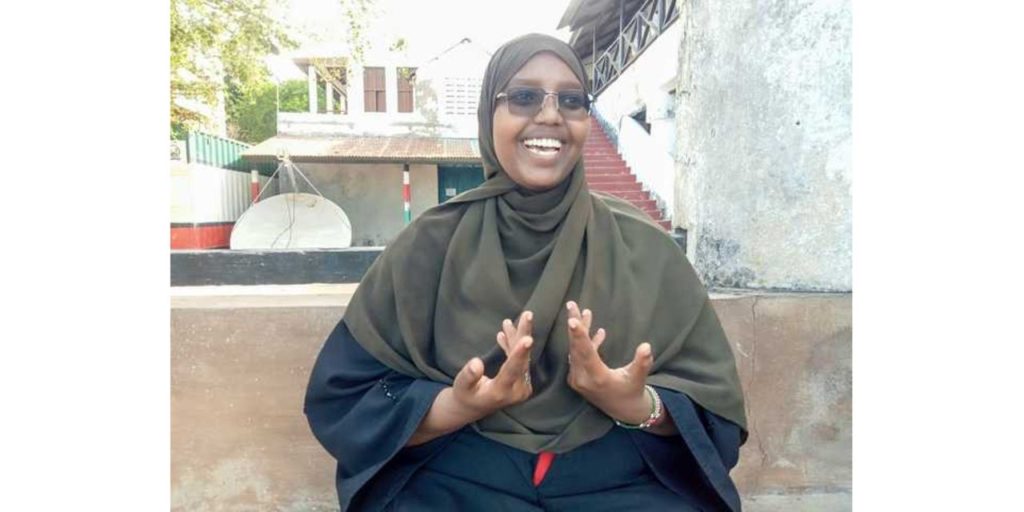
The firstborn in a family of seven is also concerned that men’s voice has continued to dwindle in recent times because of the frequent awareness and empowerment campaigns only targeting the female gender.
“As we fight for gender equity, some things are not really taken care of keenly. Nowadays, it’s easy to see the representation of women in a conference to be 70 per cent at the expense of only 30 per cent of men’s representation. This makes the men have a lesser voice, which I feel isn’t right.”
She is also worried about the fate of boys’ education. Boys’ education in Lamu has continued to dwindle as all efforts have always been concentrated on girls, she says.
He cites a recent statement from Lamu director of education Joshua Kaaga, who said many boys are dropping out of school and such a situation could see crime rates go up drastically in the near future.
“As per my observation, there has been less effort and attention geared towards the education of the boy child. In most cases, the boy child is less supervised, leaving him with a dangerous opportunity to stray. That’s why the region has very few boys’ schools as compared to their female counterparts. This has impacted negatively on boys’ education and needs to change,” says Rukia.
Lamu County has only two boys’ secondary schools—Lamu Boys and Mpeketoni Secondary schools. Tens of schools are for girls.
She emphasises the need for balance in matters of school infrastructural developments so that both boys and girls enjoy a productive learning environment and an equal opportunity for education.
Apart from fighting for men’s rights, Rukia has also been advocating equal land ownership for men and women. She has also been at the forefront of fighting against child abuse, including molestation, defilement, and sodomy, and ensuring justice is served to victims.
One of her biggest achievements is seeing the Lamu recognise that both men and women have equal rights when it comes to land inheritance and ownership.
“Through our efforts as activists, the women in Lamu are more informed of their day-to-day rights and this has reduced societal conflicts.”
Her life’s lowest point is that despite the sacrifices she has been making, especially in fighting for the rights of men, the same men have not really valued her efforts, with some despising her.
Some men are unwilling to come forward when they face challenges. She says society has always viewed her as someone with no vision just because of her dedication to fighting for people’s rights.
But she maintains that activism is in her blood and has pushed her to move forward in life with ease. “Male chauvinism is real in Lamu. The same men that I have fought for their rights are the ones viewing me as a lesser being just because I am a woman. Some even prefer not to share their problems with me. But that hasn’t hindered my pursuit for activism.”
Born in Langoni, Lamu Old Town, in 1998, she attended Lamu Girls Primary School between 2007 and 2013. She joined Shella Bright Girls High School in 2014 and completed her secondary education in 2017. In 2018, she enrolled at Shanzu Teachers Training College, Mombasa, for a P1 teaching course.
By that time, she had already made a name as a human rights defender in Lamu and neighbouring counties, having started it during her primary school days. In 2019, she reached a point where she had to quit her teaching career and immerse herself fully in the world of activism.
She has worked and received mentorship from various human rights organisations, including the Kenya National Commission on Human Rights (KNCHR), and the National Coalition of Human Rights Defenders – Kenya.
She is currently pursuing a Diploma in Community Development and Counselling at the Technical University of Mombasa, a course she says will assist her to strengthen her service to humanity.
“I am proud as an activist. It has enabled me to attend various conferences across the country and outside.”
She advises women and girls not to fear but speak up and help others as well.
The story was first published by Nation Media Group. This is not a reproduction but an amplification of the message.
Read the article of Nation Media Group page here https://nation.africa/kenya/news/gender/meet-rukia-a-young-woman-championing-men-s-rights-3848382
The story was first published by Nation Media Group. This is not a reproduction but an amplification of the message.
Read the article of Nation Media Group page here https://nation.africa/kenya/news/gender/raya-famau-real-change-begins-with-activism-3848164
Raya Famau married at 20, only to be divorced three years later.
Before her marriage in 2000, they had agreed that she would find a job to support her parents. She had trained as a community nutritionist. She then joined her husband in Nairobi, where he was working.
“But the moment we got married, he said ‘No, I want a housewife,’” she recalls.
“That is when my problem started. For three years, I was undergoing a lot of stress [and] frustrations. I wanted to go back to college, [but] he refused. Luckily, we got divorced.”
She had to return to her poor parents in Lamu, starting all over again—a turning point, not just for her, but for her community. It started with the awakening reality of having to struggle to experience menstruation with dignity. “I wouldn’t afford a Sh100 sanitary pad. I had to ask my mom for money.”
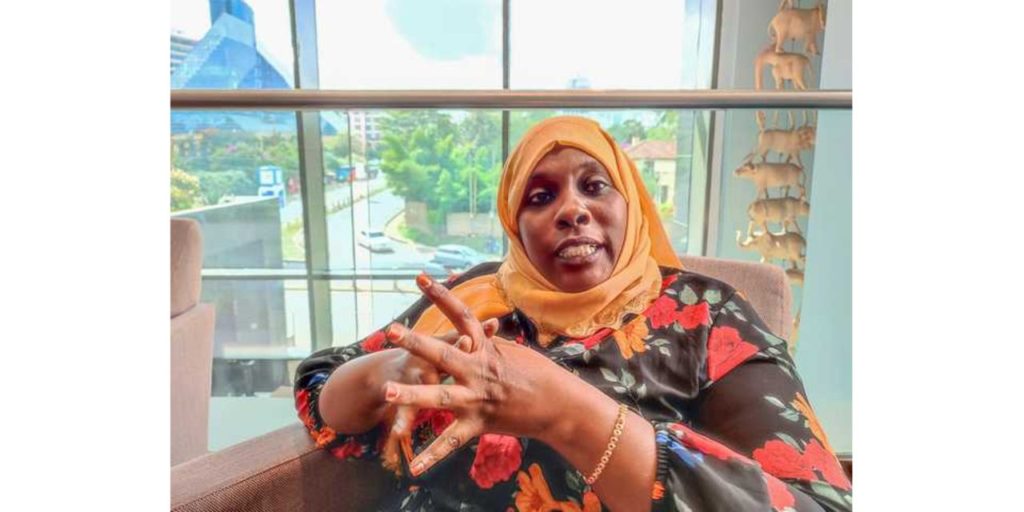
The experience jolted her. She had to find means of providing for herself. A search for a solution landed her at Kenya Red Cross, Lamu branch, as a volunteer. She was attached to Lamu District Hospital, now Lamu County Referral Hospital. At the end of the month, she got a stipend that covered her expenses.
During the time, she felt the push to get into activism. “I felt like I needed to do activism and help other suffering women.”
Now, Ms Famau is a renowned environmental activist and a founding member of Save Lamu, a coalition of community-based organisations.
In December 2019, Coast Woman Magazine feted her as woman activist of the year. This was after President Uhuru Kenyatta awarded her a certificate of recognition as a ‘Shujaa’ of Lamu County during the Mashujaa Day celebrations held in Mombasa.
Her venture into activism has seen her defy the odds. She says, women’s responsibilities under Islam are limited to indoor-cooking and taking care of their families, and not going out to protest against violation of rights.
Her defiance has been beneficial to herself and her community. Firstly, she went back to school—Technical University of Mombasa—and started with a certificate in community development and counselling. She later advanced to a diploma. And finally, she has Bachelor of Development Studies from the same institution.
Ms Famau was married just after she finished her certificate in community nutrition, but when she volunteered at the hospital, she felt working in a health facility was not her forte, hence the switch of the course.
Secondly, under Save Lamu, she participated in petitioning the government against establishing a 1,050MW African Development Bank-funded coal plant in the Kwasasi area of Hindi/Magogoni sub-county.
In 2016, the coalition, alongside other petitioners, filed a suit against the National Environmental Management Authority (Nema) and Amu Power, the company that was to establish the plant, at the National Environmental Tribunal in Nairobi.
The ruling was made in 2019, with the tribunal suspending the environmental impact assessment licence that Nema had issued to the company. It was a judgment preceded by aggressive advocacy. “We did demonstrations in Lamu [and] Nairobi. We travelled to African Development Bank to advocate that our government needs to stop this project.”
She says her near two-decade advocacy work has inspired many Lamu girls and women into pursuing education and speaking out against human rights violations.
In 2021, she founded Lamu Women Alliance, through which she is spearheading empowerment of women and girls. She runs projects on girls’ education, women economic empowerment, climate change and sexual and reproductive health.
But then, her activism has turned out to be sinking her in some deep waters. She says the national and county governments fear employing her as the officials have labelled her “a stubborn woman”, yet she applies for state jobs for which she is qualified.
For now, she is making ends meet from a portion of the seasonal grants her organisation receives to implement projects. Nevertheless, she is looking beyond the challenges.
“The future is bright for the women in Lamu. Even though we are struggling, I know [there is light] at the end of the tunnel, and we will get positions. We will work with the government and our voices will be heard,” she says.
The story was first published by Nation Media Group. This is not a reproduction but an amplification of the message.
Read the article of Nation Media Group page here https://nation.africa/kenya/news/gender/raya-famau-real-change-begins-with-activism-3848164